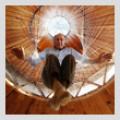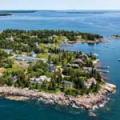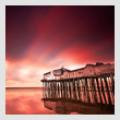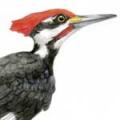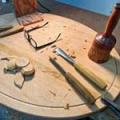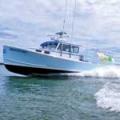Welcome Downeast
The Town, the Bays, the Mountains
Dear Friends,
We are caught up in a warm, green frenzy trying to do everything that spring calls us to do all at once. It’s a good problem to have. Cultivate, compost, plant, water, clean the house, take down storm windows, put up screens, rake, and mow. And we hurry to get most of this done before the blackflies make their appearance. Muscles we haven’t used for months ache in the morning, blisters and callouses toughen our hands, and we roll into bed good and tired at night.
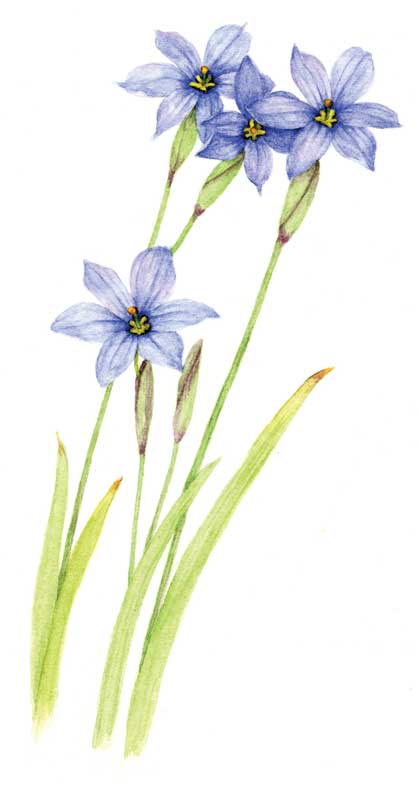 Illustration by Candice Hutchison
Field and forest report, May
Illustration by Candice Hutchison
Field and forest report, May
Maples are in flower, and birch catkins are full length and their leaves are approaching full size, as are those of beech and aspen. These leaves are as translucent as stained glass and give an enchanting light. Pears are starting to lose their blossoms and apples are coming into bloom as are blueberries. Bluets blanket the pasture and the bees are in the barrens.
Other critters are busy; many animals are raising their young at this time of the year and feeding them is their first job. Mammals are nursing their young and teaching them about life in Maine, so it’s especially important to keep dogs and cats under control right now. Many animals leave their vulnerable young for extended periods to forage. As a general rule, it is best to leave them alone. Mama will come back.
Old Codger Nostalgia Department
When I was a boy in the early 1950s, our family had a big Army surplus umbrella tent with an inside frame that would occasionally collapse without warning. We were sternly ordered not to touch the inside of the tent when it was raining because it would leak. We had flannel sleeping bags with cotton batting for padding and when these got wet you were out of luck because they took forever to dry. We had a lantern and stove that worked on white gas and would now and then burst into flames without warning. As you can see, camping was exciting and we pitched our tent in some beautiful places; I particularly remember Lake McDonald in Glacier National Park and a trout stream in British Columbia.
I also remember an intense sort of intimacy and closeness that gave rise to a lifelong sense of feeling at home in Nature. We slept shoulder to shoulder and could hear each other breathing through the wild sounds of the night. We slept under the stars on the ground with the whole Earth beneath our backs. We cooked and ate outside with the smell of wood smoke in our noses, bits of grit in our eggs, and grass between our toes. Dad liked the outdoors; Mom knew the wildflowers and gave me her Peterson’s guide when she could no longer walk. We sang “For the Beauty of the Earth” around the campfire. Looking back, there seemed to be no wall of hostility between us and the rest of Creation.
Saltwater report
Camping on an island is in a class by itself with special problems and special pleasures. First, many coastal islands are private, so we have to find the right island that is available for camping. For this, nothing matches the Maine Island Trail Association, which oversees camping at 240 island and coastal campsites offered by landowners along 375 miles of coast. Learn about membership, the locations, and policies at mita.org or by calling 207-761-8225.
Special problems of island camping include bringing your own water and being prepared to carry off ALL your trash and human waste. This takes some planning. Fog can be a problem, too. On one of my first island adventures 30 years ago, I set up my tent under a huge spruce on Tinker Island by the shore hoping to be protected from any showers during the night. When I awoke, my tent was soaking wet from fog dripping off the tree while the ground around the tree was perfectly dry. I learned my lesson. Another time we camped in fog for five straight days and navigation from island to island depended on chart and compass with a lot of dead reckoning. Special pleasures include beachcombing, swimming in saltwater, new plants to identify, and watching sunrise over the water. Unforgettable.
Natural events
We watch the march of spring passing in front of our eyes. It’s like a Memorial Day parade only infinitely more grand. The explosion of leaf and flower has lifted us up from planet winter and is dropping us ever so gently onto planet summer. While apple trees begin to drop their petals and lilacs offer up their heady perfume, dandelion seeds float through the air bringing memories of childhood when we would blow the seeds in each other’s faces and laugh and laugh without a care in the world. Heart-shaped new aspen leaves tremble in the slightest breeze and chokecherry blossoms decorate the roadside. Apple and blueberry growers always hope for some warm, sunny, calm days so that the bees can be busy pollinating. This is the first step in getting some good fruit by the end of the growing season.
Natural events, June
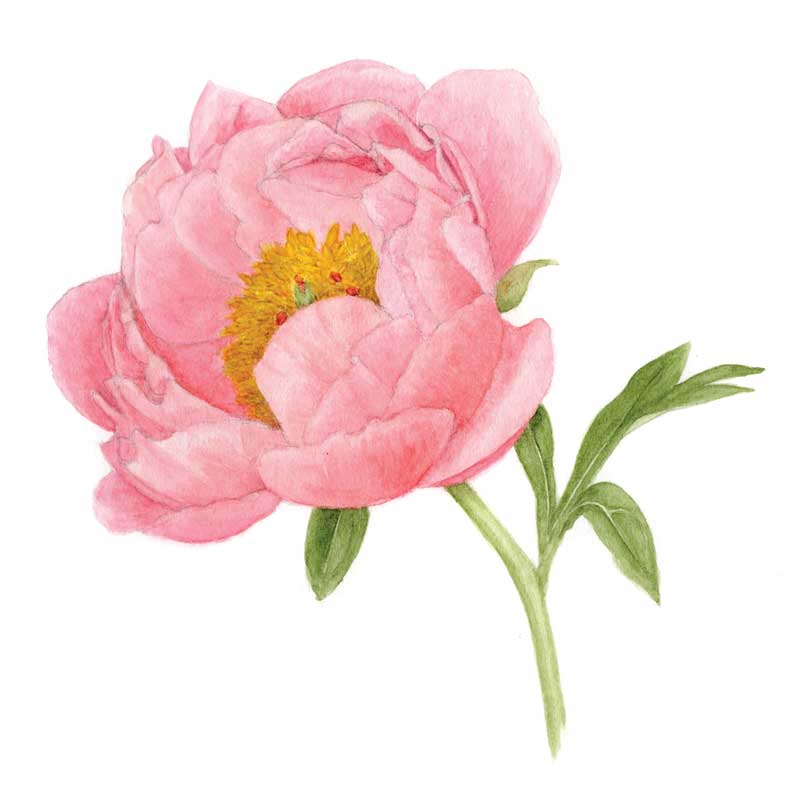 The flowers are flourishing, and that means pollen. Pollen is often seen as a nuisance these days, but it has a venerable history and is viewed as sacred by pueblo people and by the Navajo, the largest Native American tribe. Archaeologists value pollen for dating ancient burials and other sites because the shells of pollen grains fossilize well, the oldest yet found being some 130 million years old! The trees that bloomed around here in May are primarily wind-pollinated and have small flowers, often green and not showy, with the notable exception of red maples. The wind spreads pollen far and wide, making millions sneeze and wheeze and leaving a light coating of yellow dust on our cars. Hay and wild grasses also tend to be wind-pollinated and are coming into bloom now as any hay fever sufferer will know. Later in the season we’ll see that cussed sneeze-monger, ragweed, which is also wind-pollinated.
The flowers are flourishing, and that means pollen. Pollen is often seen as a nuisance these days, but it has a venerable history and is viewed as sacred by pueblo people and by the Navajo, the largest Native American tribe. Archaeologists value pollen for dating ancient burials and other sites because the shells of pollen grains fossilize well, the oldest yet found being some 130 million years old! The trees that bloomed around here in May are primarily wind-pollinated and have small flowers, often green and not showy, with the notable exception of red maples. The wind spreads pollen far and wide, making millions sneeze and wheeze and leaving a light coating of yellow dust on our cars. Hay and wild grasses also tend to be wind-pollinated and are coming into bloom now as any hay fever sufferer will know. Later in the season we’ll see that cussed sneeze-monger, ragweed, which is also wind-pollinated.
The larger, more showy flowers of the field and garden are mostly pollinated by insects, so their pollen is heavy and sticky and unlikely to cause allergic distress. Domestic honey bees, as well as wild pollinators of which Maine has some 270 species, are busy when the sun shines, loading up on nectar and pollen to feed the hive with their rich harvest. Both domestic honeybees and their wild cousins are in danger from too much pesticide use and habitat destruction. Planting bee-friendly flowers can make a difference. So can refraining from using herbicides and pesticides.
Rank opinion
We see the pollen on our cars and may grumble and brush it off or wash the car. But consider for a moment the profound generosity of the wild plants distributing this yellow storm of rich proteins, fats, and carbohydrates onto every living thing indiscriminately, enriching the soil, and feeding the myriad tiny animals which use this ambrosia for food. Plants do not hoard these golden riches for themselves. They spread their wealth far and wide for the benefit of all. And they receive back in kind. We can take a lesson in true generosity from them.
Field and forest report
We have three kinds of peonies in our garden—red, white, and pink. The red blooms first, then the white, then the pink. My wife, Rebecca, and I agree that peonies are the drama queens of the garden scene. They are like Victorian ladies who wear gaudy hats too big for their heads. When it is hot they swoon and droop, and when it rains a bit too hard they faint dead away and fall to the ground, and their hats fall off. Then they have to be helped up. Victorian ladies.
Farther afield, the white pines are finishing their bloom, and their pollen that has fallen on everything is less every day. You can see the pale orange pine cones swelling on their branches while last year’s pine needles turn yellow and die and prepare to fall as their new growth reaches for the sun.
Summer is surging and seething all around. If our ears were as good as a dog’s, or a mouse’s, or a robin’s, we might be able to hear the constant rustle and hum of summer’s songs of fecundity: the scratching of thousands of earthworms in the ground and the thumping of hopping robins looking for them, the peeping of field mice in the tall grass and hatchlings in the high branches, the rattling of a billion insects going about their custodial business of cleaning up the earth, the whisper of snakes shedding their skins in stone walls, bees buzzing, frogs mating, fish chewing, petals falling, seeds swelling, bark stretching; all this and so much more that we can’t see or hear or smell because of our limited senses. Birds and bees can see colors we cannot see. Ants can smell odors that are far beyond our ability to sense. Bats can hear sounds, like moths in flight, that are inaudible to us.
But it’s all there and it’s all happening in these rich warm summer days, life at its height, day and night.
Seedpod to carry around with you
“You can live for years next to a big pine tree, honored to have so venerable a neighbor even when it sheds needles all over your flowers or wakes you dropping big cones at still of night.” —From Denise Levertov, 1923-1997
That’s the Almanack for this time. But don’t take it from us—we’re no experts. Go out and see for yourself.
Yr. mst. humble & obd’nt servant,
Rob McCall
Rob McCall lives in Brooklin, Maine. This almanack is excerpted from his radio show on WERU FM, which can be streamed on weru.org.
Related Articles
Share this article:
2023 Maine Boat & Home Show

Join Us for the Maine Boat & Home Show!
Art, Artisans, Food, Fun & Boats, Boats, Boats
August 11 - 13, 2023 | On the waterfront, Rockland, Maine
Click here to pre-order your tickets.
Show is produced by Maine Boats, Homes & Harbors magazine.








